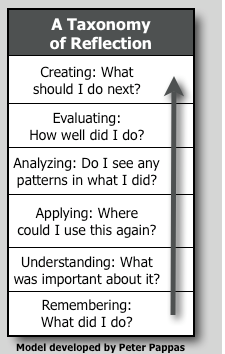As I write this blog post, I am reflecting on things that work well in my classroom...resources and strategies that give my students the best opportunity to learn in ways that are meaningful and engaging for them. In doing so, I will realize what went well, what didn’t go well, and what I can do to become a better teacher.
Just as I use reflection to improve, students can and should be encouraged to do the same. I should expect them to do the same. Reflection is a very important piece to the learning puzzle and when it is left out, it seems as though something is missing and meaningful connections are not made. Reflection is such an important part of student learning. I have just begun to explore true reflection in my classroom and my students are learning to look back and make connections each day.
Reflection gives my students the opportunity to be an active participant in the learning (Why The Brain Benefits from Reflection in Learning, TeachThought). We often reflect about Genius Hour, Depth and Complexity novel studies, and other classroom activities. In doing so, the learning becomes real and meaningful. And, honestly, if it’s not real and meaningful for our students, what's the point? Reflection adds meaning which has to be there for true learning to take place.
My students reflect most of the time by blogging. This is such a wonderful way for students to be able to share their learning and process what they have just taken in. It serves as an outlet...a place to share their thoughts, feelings, and expertise about what they have learned. It is in their blogs that I am able to see the learning through their eyes, experience the classroom as they do, and use that information to make my classroom a meaningful experience for each one of them.
However, I began to notice in reading their blogs that many of them were simply telling me what they did that day in class. According to Peter Pappas' Taxonomy of Reflection, they were simply remembering. They were not making the connections and understanding the reflection process as well as I had hoped. They were struggling with truly understanding the benefit of reflection and seeing it as an important piece of the puzzle. I wanted them to use their higher order thinking skills to analyze, evaluate, and create.
In searching for meaningful ways to teach reflection, I recently came across Roll and Reflect cubes on Tony Vincent’s website, Learning in Hand. These cubes use QR codes to encourage reflection in many different ways. Students scan a code for a reflection question. Some of the questions include, “In what ways have you gotten better?”, “What did you learn that will help you most in the future?”, “One thing I can improve upon is…”, and “What was easy for you?”.
After they read their question, students roll the cube to find out how they will respond. They may draw a picture, make a list, create a word cloud, write a quote, or even write their response in words that rhyme. All of the response options require students to think differently about how they reflect and takes their thinking to a higher level...SCORE!
I recently printed, created the cubes, and introduced them to the students. They loved it! It has been a great way to reintroduce them to reflection and encourage them to think about their thinking.
I have decided that I will also ask my students to just scan the Reflection Question card for their question and simply write their response using KidBlog. I only have one iPad in my room but have several Chromebooks so some students can be blogging while others are responding by rolling the cube. I actually taped the codes next to the computers at our “blogging station” so that students will have easy access and remember to scan before they write.
My students are now understanding why we reflect and how it can help their learning “stick”. It will be very interesting to compare student blog posts at the beginning of the year to the posts as we go through this process of taking our reflections to a higher level.
I recently printed, created the cubes, and introduced them to the students. They loved it! It has been a great way to reintroduce them to reflection and encourage them to think about their thinking.
I have decided that I will also ask my students to just scan the Reflection Question card for their question and simply write their response using KidBlog. I only have one iPad in my room but have several Chromebooks so some students can be blogging while others are responding by rolling the cube. I actually taped the codes next to the computers at our “blogging station” so that students will have easy access and remember to scan before they write.
My students are now understanding why we reflect and how it can help their learning “stick”. It will be very interesting to compare student blog posts at the beginning of the year to the posts as we go through this process of taking our reflections to a higher level.
“We do not learn from an experience.
We learn from reflecting on experience.”
John Dewey
John Dewey
Below are some amazing articles and resources on reflection that I have used to find ways to make reflection meaningful in my classroom. Please feel free to comment and share some of the ways you use reflection to create meaningful learning for your students.
A Taxonomy of Reflection: Critical Thinking For Students, Teachers, and Principals (Part 1) - Copy/Paste


